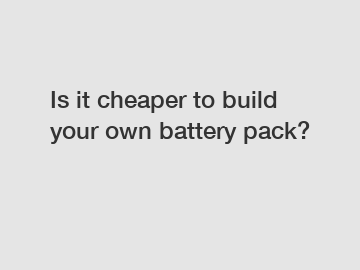Is it cheaper to build your own battery pack?
When it comes to powering our devices, batteries play a crucial role in ensuring we stay connected and on the go. With advancements in technology, we are now seeing a proliferation of devices that require high-capacity battery packs to keep them running for extended periods. This has led to a growing interest in DIY projects that involve building custom battery packs. But the question remains - is it actually cheaper to build your own battery pack?
As someone with extensive experience in electronics and DIY projects, I can confidently say that building your own battery pack can indeed be cost-effective if done correctly. However, there are a number of factors to consider before embarking on such a project.
For starters, the cost of materials must be taken into account. Building a battery pack requires a number of components such as batteries, wiring, connectors, and possibly a battery management system (BMS). While it is possible to find these components at a lower cost than purchasing a pre-made battery pack, it's important to remember that quality should not be compromised. Opting for cheaper, lower-quality components may save you money upfront, but could result in decreased performance and safety risks down the line.

Another consideration is the time and effort required to assemble the battery pack. Depending on the complexity of the project, building a custom battery pack can be a time-consuming process that requires careful planning and technical know-how. You will need to carefully design the layout of the batteries, ensure proper insulation and protection, and test the pack for safety and efficiency. This may involve soldering, wiring, and troubleshooting, which can be intimidating for those new to DIY electronics.
In addition to the upfront costs and labor involved, there are also safety considerations to keep in mind when building your own battery pack. Lithium-ion batteries, which are commonly used in consumer electronics, can be dangerous if mishandled or improperly assembled. Overcharging, short-circuiting, or physical damage to the batteries can result in thermal runaway, a potentially catastrophic event that can lead to fire or explosion. To mitigate these risks, it's essential to follow best practices for battery assembly and usage, and to invest in a quality BMS to monitor and regulate the battery pack's performance.
Despite these challenges, there are some clear advantages to building your own battery pack. For one, customization is a major benefit. By building a custom battery pack, you have the flexibility to tailor the pack's capacity, voltage, and size to meet your specific needs. This can be particularly useful for niche applications or projects where off-the-shelf battery packs may not be suitable.
In addition, DIY battery packs can offer a sense of fulfillment and satisfaction that comes with creating something from scratch. For those with a passion for electronics and a desire to learn new skills, building a battery pack can be a rewarding experience that leads to a greater understanding of how batteries work and how they can be optimized for different applications.
So, is it cheaper to build your own battery pack? The answer ultimately depends on your goals, budget, and level of expertise. If cost savings is your primary concern and you have the necessary skills and tools to safely assemble a battery pack, then building your own pack may be a viable option. However, if you are inexperienced or looking for a quick and reliable solution, purchasing a pre-made battery pack from a reputable manufacturer may be the better choice.
In conclusion, building your own battery pack can be a cost-effective and rewarding endeavor for those willing to put in the time and effort. By carefully considering the factors discussed above and taking proper precautions, DIY enthusiasts can create custom battery packs that meet their power requirements and showcase their technical skills. So if you're up for the challenge, why not give it a try and see what you can create?
For more information, please visit high-output ev battery pack assembly, cylindrical lithium battery assembly line, custom battery pack assembly line.

Comments
0